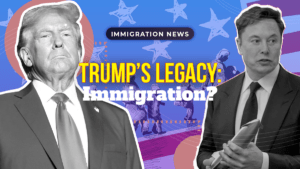
At Bogin, Munns & Munns, we understand that immigration law is complex and often influenced by shifting political landscapes. With over 40 years of experience serving clients across Florida, our dedicated immigration team is here to provide clarity and support, no matter how uncertain the future may seem.
As discussions around a potential 2025 Trump administration gain traction, questions about how immigration policies could evolve are on the minds of many. In this blog, we explore key aspects of legal immigration under the Trump administration, focusing on how pathways like the EB2 NIW and EB1A visas have historically fared and what could lie ahead.
If you’re seeking guidance on navigating these changing times, our experienced attorneys are ready to assist. Stay informed, stay prepared, and trust Bogin, Munns & Munns to be your partner in understanding and addressing your immigration concerns.
When considering a potential 2025 Trump administration, many envision a strict approach to immigration. However, a closer look reveals that the 45th administration demonstrated a distinct stance: restrictive toward illegal immigration but more open to highly skilled legal immigration through programs like the EB2 National Interest Waiver (NIW) and the EB1 Extraordinary Ability visa (EB1A). Approval rates for these employment-based categories remained high during Trump’s first term, suggesting a strategic focus on merit-based immigration as a route for highly skilled individuals to enter the U.S. legally.
President-elect Donald Trump has vowed he’ll deport millions of undocumented immigrants out of the US when he returns to power. Could a new Trump administration build on this legacy and further shape U.S. legal immigration policy to emphasize high-impact talent?
Legal Immigration Under the Trump Administration: A Pragmatic Approach
During the previous administration, Trump’s policies on immigration largely focused on curbing illegal immigration, often through high-profile enforcement measures at the U.S.-Mexico border. At the same time, a surprising trend emerged within legal immigration pathways. Despite strict immigration rhetoric, the EB2 NIW and EB1A visa categories saw higher approval rates from 2017 to 2021 (compared to 2023-2024), suggesting an administration approach that prioritized attracting specialized skills that benefit the U.S. economy and national interest.
The Role of the Dhanasar Framework in Shaping EB2 NIW Approvals
To consult with an experienced immigration lawyer today
855-780-9986
The EB2 NIW category operates under the Dhanasar framework, established by the 2016 Matter of Dhanasar federal court decision, which sets the criteria for petitioners, including showing substantial merit, national importance, and benefit to the U.S. if working independently. This judicial framework will remain binding regardless of any change in administration unless revised by the court, which is unexpected in the near future. Thus, the Dhanasar legal framework for EB2 NIW is expected to continue in a future Trump administration.
Elon Musk: A Model and Key Player for High-Impact Immigration Policy?
Under a potential 2025 Trump administration, the focus on legal immigration may shift even more decisively toward attracting highly skilled, high-impact individuals. Elon Musk, who immigrated to the U.S. legally and became a transformative force in sectors like technology, energy, and transportation, exemplifies the type of immigrant Trump’s policies have aimed to attract. Through visa categories like the EB2 NIW and EB1A, which prioritize individuals with exceptional talent or advanced degrees, the previous administration showed an interest in selectively opening doors for immigrants who could demonstrably benefit the U.S. Musk’s success story underscores the value of a merit-based immigration system and highlights how skilled immigrants can significantly contribute to American innovation and economic growth.
In the 2025 administration, Musk’s influence is likely to extend beyond inspiration. Close to Trump and positioned to play a significant role within the newly proposed Department of Government Efficiency (DOGE), Musk would bring his entrepreneurial perspective to government reform efforts, with potential influence over immigration policies as well. Advocating for a meritocratic model, Musk could drive forward a vision for expanded pathways for skilled professionals—those who, like him, bring transformative potential. With Musk’s support, a future Trump administration may create a more strategic, skill-oriented immigration system that bolsters the U.S. as a top destination for global talent and reinforces its competitive edge on the world stage.
A 2025 Trump Administration’s Vision for Affirmative Asylum
When Trump returns to office in 2025, we anticipate that his administration will likely build on the affirmative asylum framework he supported during his first term. With the border expected to be more secure, a renewed Trump administration could further streamline the asylum process, reducing interview wait times for individuals who enter legally and seek protection through established channels. By prioritizing border control and limiting unvetted entries, Trump’s immigration strategy could focus on those who adhere to legal entry processes, enhancing efficiency within the asylum system. However, the administration will still need to address existing backlogs, as the high volume of pending cases remains a challenge to fully optimizing interview scheduling. If Trump’s team can strike a balance between enforcing border security and offering timely relief to affirmative asylum seekers, it could represent a lasting shift toward an asylum system that rewards lawful entry and commitment to legal processes.
Will I Get Deported?
Click to contact our Florida Attorneys today
One of the most pressing questions for many immigrants is: “If Trump is re-elected, am I at risk of being deported?” The answer depends on various factors, such as immigration status, compliance with U.S. laws, and pending cases. While past policies have shown stringent measures against undocumented immigrants, legal residents and those on valid visas are typically not affected unless they violate terms of their status.
If you are concerned about how a potential 2025 Trump administration could impact your immigration status or have questions about legal pathways, our dedicated immigration team at Bogin, Munns & Munns is here to help. Contact us today for expert guidance and personalized support to ensure your path forward in the U.S. remains secure.
Meet our team:
Call or Submit Our Consultation Request Form Today






